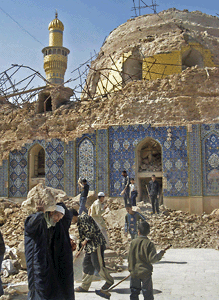An Estimated 500,000 Iraqis Perished in Iraq War
October 16, 2013
Some half a million people died in Iraq as a result of war-related causes between the U.S.-led invasion in 2003 and July 2011, announced researchers from Simon Fraser University in Canada, Mustansiriya University in Iraq, and Johns Hopkins University and the University of Washington in the United States. The researchers based their estimate on randomized sampling. Interviewers surveyed 2,000 households in 100 geographical clusters across Iraq’s 18 provinces in mid-2011. The half-million figure they reached included deaths from the invasion, the subsequent insurgency, and the horrific wave of sectarian violence unleashed by the war. The researchers noted that their estimates are associated with such “substantial uncertainties” as respondents being asked to recall events that occurred up to 10 years earlier.
The administration of U.S. President George W. Bush launched the invasion of Iraq in March 2003 based on claims that Iraqi President Saddam Hussein and his government were a threat to the security of the United States and other countries. President Bush and Vice President Richard Cheney accused Hussein of illegally developing and possessing weapons of mass destruction. They also argued that links existed between Hussein’s government and terrorist organizations, including al-Qa’ida, the group responsible for the terrorist attacks in the United States on Sept. 11, 2001. Most experts now doubt that there was any working relationship between Iraq and al-Qa’ida. The claims that Hussein had weapons of mass destruction also turned out not to be true.

The bombing of the al-Askari shrine on Feb. 22, 2006, led to massive violence between Sunni and Shī`ite Muslims and made it more difficult for U.S.-led forces to provide security for Iraqis. The shrine, in Samarra, is one of the holiest sites to Shī`ite Muslims. (© Dia Hamid, AFP/Getty Images)
Sectarian violence is again on the rise in Iraq. According to United Nations statistics, nearly 5,000 civilians have died in sectarian attacks–primarily Sunni militants on Shi’ite civilians–between January and September of this year. More than 3,000 people died in 2012. Iraqi government officials blame the attacks on al-Qa’ida-linked militants, whom officials suggest are attempting to build on the Sunni minority’s discontent toward what they consider to be second-class treatment by Iraq’s Shi’ite-led government.
Additional World Book articles:
- The War in Iraq: The Military Campaign and Aftermath (a special report)
- The War in Iraq: Shifting Alliances on the World Stage (a special report)
- Iraq: A Quest for Political Identity in a Second Year of War (a special report)
- Iraq 2005 (a Back in Time article)
- Iraq 2006 (a Back in Time article)
- Iraq 2009 (a Back in Time article)
- Iraq 2010 (a Back in Time article)


